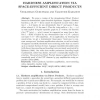Free Online Productivity Tools
i2Speak
i2Symbol
i2OCR
iTex2Img
iWeb2Print
iWeb2Shot
i2Type
iPdf2Split
iPdf2Merge
i2Bopomofo
i2Arabic
i2Style
i2Image
i2PDF
iLatex2Rtf
Sci2ools
120
click to vote
CC
2008
Springer
2008
Springer
Hardness Amplification via Space-Efficient Direct Products
We prove a version of the derandomized Direct Product lemma for deterministic space-bounded algorithms. Suppose a Boolean function g : {0, 1}n {0, 1} cannot be computed on more than a fraction 1 - of inputs by any deterministic time T and space S algorithm, where 1/t for some t. Then for t-step walks w = (v1, . . . , vt) in some explicit d-regular expander graph on 2n vertices, the function g (w) def = (g(v1), . . . , g(vt)) cannot be computed on more than a fraction 1 - (t) of inputs by any deterministic time T/dt - poly(n) and space S - O(t) algorithm. As an application, by iterating this construction, we get a deterministic linear-space "worst-case to constant average-case" hardness amplification reduction, as well as a family of logspace encodable/decodable error-correcting codes that can correct up to a constant fraction of errors. Logspace encodable/decodable codes (with linear-time encoding and decoding) were previously constructed by Spielman (1996). Our codes ha...
| Added | 09 Dec 2010 |
| Updated | 09 Dec 2010 |
| Type | Journal |
| Year | 2008 |
| Where | CC |
| Authors | Venkatesan Guruswami, Valentine Kabanets |
Comments (0)

